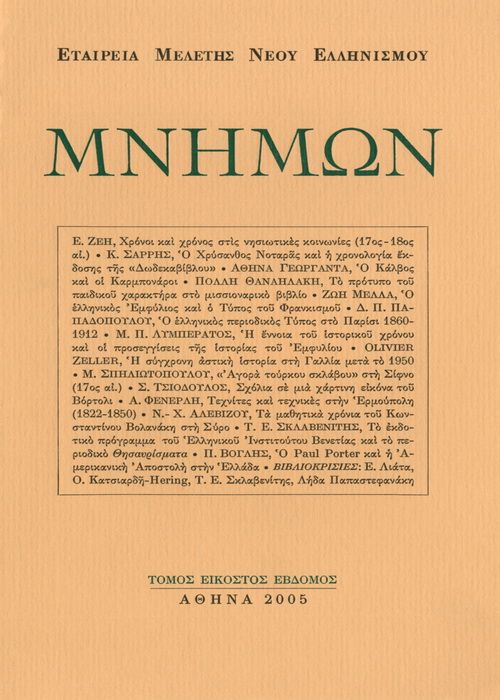ΟΙ ΠΡΟΤΕΣΤΑΝΤΙΚΕΣ ΙΔΕΕΣ, Ο MARK TWAIN ΚΑΙ ΤΟ ΠΡΟΤΥΠΟ TOΥ ΠΑΙΔΙΚΟΥ ΧΑΡΑΚΤΗΡΑ ΣΤΟ ΜΙΣΣΙΟΝΑΡΙΚΟ ΒΙΒΛΙΟ ΣΤΗΝ ΕΛΛΑΔΑ (19ΟΣ ΑΙ.)
Περίληψη
Polly Thanailaki, The protestant ideas, Mark Twain and the model of the child's character in the missionary books in Greece in the 19th century
This essay explores the historical evolution which was observed in the shaping of the child's model of character in the American literature books of the 19th century within the frame of the protestant ideas and values. It also studies the impact of this development in the missionary books for children in Greece in the same century. We particularly focus on Mark Twain's revolutionary presence in the American children's literature by, firstly, placing emphasis on the change that the great American author made to the strict puritan model with the shaping of a more liberal and «innocent» children's character and, secondly, by analyzing the response which Twain's books met from the Greek 19th century readers. In this paper we argue that Twain's writing, known for realism, biting social satire and memorable children's characters, influenced the Greek children's literature in the end of the 19th century. The translations of his works started taking the lead in the end of this century in Greece. Moreover, this essay studies the re-shaping of the child's character in the missionary books published in Greece in the mid 19th century. The missionaries also followed the new trend for the children's character. The missionary stories appeared less didactic and strict.
Λεπτομέρειες άρθρου
- Πώς να δημιουργήσετε Αναφορές
-
ΘΑΝΑΗΛΑΚΗ Π. (2005). ΟΙ ΠΡΟΤΕΣΤΑΝΤΙΚΕΣ ΙΔΕΕΣ, Ο MARK TWAIN ΚΑΙ ΤΟ ΠΡΟΤΥΠΟ TOΥ ΠΑΙΔΙΚΟΥ ΧΑΡΑΚΤΗΡΑ ΣΤΟ ΜΙΣΣΙΟΝΑΡΙΚΟ ΒΙΒΛΙΟ ΣΤΗΝ ΕΛΛΑΔΑ (19ΟΣ ΑΙ.). Μνήμων, 27, 109–127. https://doi.org/10.12681/mnimon.813
- Τεύχος
- Τόμ. 27 (2005)
- Ενότητα
- ΜΕΛΕΤΕΣ
Οι συγγραφείς των άρθρων που δημοσιεύονται στο Μνήμονα διατηρούν τα δικαιώματα πνευματικής ιδιοκτησίας επί των άρθρων τους, δίνοντας στο περιοδικό το δικαίωμα της πρώτης δημοσίευσης. Άρθρα που δημοσιεύονται στο Μνήμονα μπορούν να χρησιμοποιούνται ελεύθερα, χωρίς δικαίωμα τροποποίησης (δημιουργία παράγωγου έργου) με αναφορά στο συγγραφέα και στην πρώτη δημοσίευση για μη κερδοσκοπικούς σκοπούς(άδεια Creative Commons 4.0). To Εθνικό Ίδρυμα Ερευνών διατηρεί το δικαίωμα να δημοσιεύει, να αναπαραγάγει, να παρουσιάζει στο κοινό, να διανέμει και χρησιμοποιεί άρθρα που δημοσιεύονται στο Μνήμονα σε οποιοδήποτε μέσο και μορφή είτε μεμονωμένα είτε ως μέρη συλλογικών έργων, για όλο το χρόνο διάρκειας προστασίας της πνευματικής ιδιοκτησίας και για όλες τις χώρες του κόσμου. Αυτό περιλαμβάνει ενδεικτικά και όχι αποκλειστικά, το δικαίωμα δημοσίευσης των άρθρων σε τεύχη του περιοδικού Μνήμων, αναπαραγωγής και διανομής μεμονωμένων αντιγράφων των άρθρων, αναπαραγωγής ολόκληρων των άρθρων σε άλλη έκδοση του ΕΙΕ, και αναπαραγωγής και διανομής των άρθρων ή περίληψης αυτών με χρήση πληροφορικού συστήματος αποθετηρίου.



